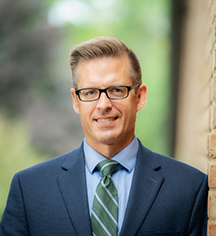Many congregations today find themselves wrestling with inherited buildings that no longer fit their present reality—spaces that are underutilized, expensive to maintain, and disconnected from their neighbors. But what if reimagining church spaces could transform these perceived burdens into powerful assets for community flourishing? Tim Anderson and Tabitha Montgomery, co-executive directors of Flourish Placemaking Collective, have spent years helping churches discover exactly that possibility.
In this conversation with host Dwight Zscheile, Tim and Tabitha share their journey from community organizers searching for programming space to consultants helping churches practice what they call “placemaking”—centering the broader community rather than just congregational needs when thinking about church facilities. They discuss the practical steps churches can take when reimagining church spaces, from honest self-assessment to developing a “theology of space,” and share inspiring examples like their own Center for Belonging, where a unused church basement became home to seven thriving nonprofit partners. Whether your congregation has 15 members or 150, this episode offers hope and practical wisdom for stewarding church property in ways that serve both faithful mission and neighborhood flourishing.



